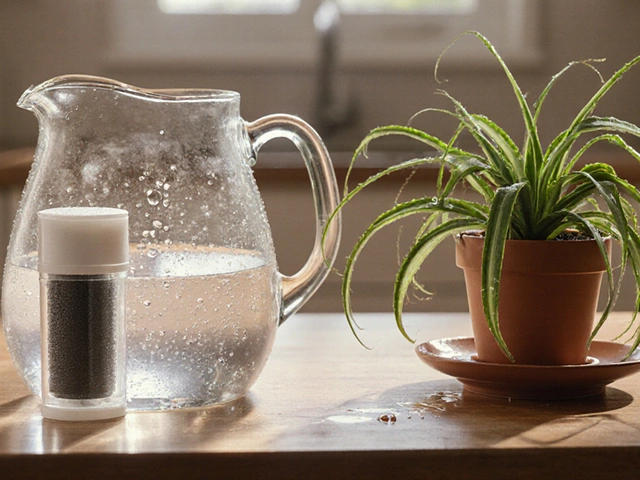Ever thought of a plant that sticks around through all seasons in India? Say hello to the marigold. This flower is like that friend who's up for anything, anytime. Picture vibrant oranges and yellows brightening up your garden all year long. The beauty of marigolds is they don't mind the hot summers or the rainy days—they thrive through it all.
These little champions are not just about looks. Marigolds are known to help keep pests at bay. If you're a gardener tired of dealing with pesky insects, plant a few marigolds, and you might notice fewer uninvited guests munching on your veggies. Plus, they're super easy to grow, even if you're not exactly a pro in the gardening department.
Let's get into how you can bring these all-season beauties into your life. Stick around for some practical tips on caring for them year-round, using them as natural pest control, and making them a vibrant part of your garden.
- The Resilient Marigold
- Year-Round Care Tips
- Marigolds and Pest Control
- Integrating Marigolds in Gardens
The Resilient Marigold
Marigolds are like the tough cookies of the plant world, and when you're looking for an all-season plant in India, these beauties top the list. Why do they deserve such credit? Well, first, they've got a knack for surviving the unpredictable swings of Indian weather. Whether it's scorching heat or downpour season, marigolds keep their bright smile on.
Weather Warriors
The secret to their resilience lies in their adaptability. These plants have deep roots—literally. Their robust root systems allow them to soak up the necessary nutrients and water, making them less dependent on the fickle weather.
Simple Growth
Don't let their hearty nature fool you into thinking they're high-maintenance. Planting marigolds is as easy as pie. They grow well in both pots and directly in the ground. All they need is a spot with good sunlight, and you're halfway there. Whether you're a green-thumbed expert or a newbie just dabbling in gardening, these flowers don't ask for much.
The Everyday Benefits
- Color Burst: Their bright colors are an instant mood booster.
- Pest Defense: They naturally repel problematic insects like mosquitoes.
- Companion Planting: Marigolds pair well with other plants, supporting their health.
Ever wondered how marigolds perform across different regions in India? Here's an interesting fact: in southern parts, they bloom practically on autopilot during the dry winter, acting like the garden's very own sunshine.
Year-Round Care Tips
Keeping marigolds happy throughout the year isn’t much of a challenge. Once they're planted, they pretty much take care of themselves. But a little TLC can help them stay bright and perky.
Watering Wisely
In general, marigolds don't need a lot of water. During summer, give them a drink when the soil feels dry, but make sure not to drown them. They prefer their roots not sitting in a pool, so good drainage is key.
Sunlight Needs
Place your marigolds in a spot where they get plenty of sunshine. At least six hours of direct sunlight is perfect. They'll reward you with blooms that seem to say 'thank you' by the time evening rolls around.
Feeding the Blooms
These plants aren’t demanding on the nutritional front but a little fertilizer now and then can give them a boost. Use a balanced water-soluble fertilizer once every month during their blooming period.
Pest Management
Ironically, while marigolds deter some pests, slugs and snails are fond of them. Regularly check your plants and handle any invaders. A simple homemade soap spray can do the trick.
| Month | Watering Frequency | Care Note |
|---|---|---|
| January - March | Lightly, only when dry | Check for pests |
| April - June | Once a week | Watch for overwatering |
| July - September | Twice a week | Fertilize monthly |
| October - December | Moderately, less frequent | Prune as needed |
With these simple steps, your all-season marigold should thrive in your garden, bringing color and charm day in and day out. Remember, it's all about keeping things straightforward and consistent.

Marigolds and Pest Control
When it comes to keeping those unwanted creepy crawlers at bay, marigolds pack a surprising punch. Their secret weapon? They produce a substance called thiophene, which is known to repel pesky nematodes and other insects.
Imagine planting an all-natural shield around your favorite veggies to keep them from being nibbled on. That’s the power of marigold plants, especially useful in India, where gardens can be a buffet for bugs.
How It Works
The strong scent of marigolds often confuses and deters many pests. In fact, farmers and gardeners have been using marigolds for ages to protect their crops. These plants can help disrupt the pests’ ability to locate their target plants, thanks to their potent aroma.
Effective Strategies
- Border plant your vegetable gardens with marigolds to create a protective barrier.
- Mix them among your roses to deter aphids—rose gardens look stunning with a splash of marigold color.
- Use marigold petals as mulch; they’ll break down and continue to enrich your soil.
Even though marigolds are effective, remember that no method is bulletproof. Supporting your marigold strategy with other robust pest control measures can make your garden a bug-free sanctuary.
Fun Fact
A study showed that gardens with marigolds had a 20% reduction in pest population compared to those without. So, next time you're plotting your garden layout, consider integrating this all-season plant. It could be just the partner your tomatoes have been waiting for.
Integrating Marigolds in Gardens
If you're looking to jazz up your garden with something easy and beneficial, marigolds are your go-to. They mix well with other plants, offering both aesthetic beauty and functional perks.
Companion Planting
Marigolds work wonders as companions to various veggies. They are known to help repel nematodes and pests. Consider planting them with tomatoes, peppers, and beans. You'll not only get a burst of color but also keep harmful bugs at bay.
Garden Design Tips
- Border Beauties: Use marigolds to create vibrant borders around flower beds or pathways. Their bright colors contrast beautifully with greens.
- Mixed Beds: Plant marigolds alongside other flowering plants for a riot of colors and textures.
- Container Gardens: If space is a concern, marigolds do great in pots. Place them on patios or balconies for an instant lift.
Seasonal Care
Marigolds are low maintenance. They need about six hours of sunlight each day and prefer well-drained soil. Regular deadheading—the simple removal of faded flowers—will keep your marigolds blooming non-stop.
Fun Fact
Did you know that in India, marigolds are used extensively in festivals and weddings? They're a symbol of prosperity and are often used in garlands and decorations.
Integrating marigolds into your garden setup is not just easy but offers year-round benefits. So why not spice up your gardening game with these all-season wonders?





